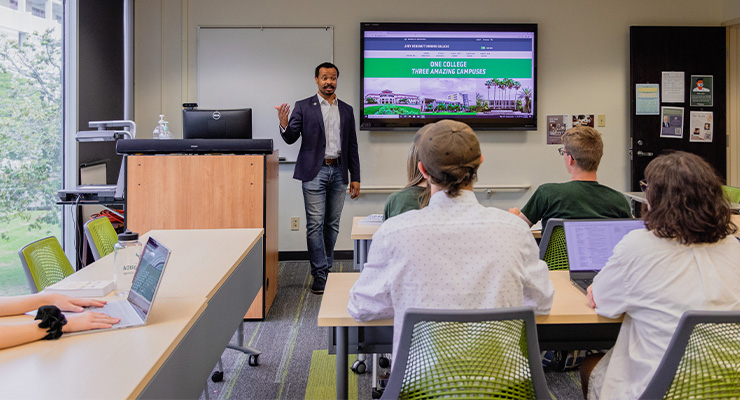What Honors College Resources Should You Expect?
By Haley DeLeon | Last Updated: Mar 5, 2025

If you’re a high-achieving junior or senior in high school, you’re likely considering an Honors College experience when you take the next step in your academic journey.
Honors Colleges are typically found at big, public universities and function as distinct colleges within the university. They may have their own academic advisors, scholarships, study abroad opportunities, on-campus facilities, and course offerings.
Here are some resources that you should expect from an Honors College.
Academic Support
Honors Colleges typically offer more personalized, in-depth academic support, such as dedicated advisors and faculty mentorship.
For example, advisors at the USF Judy Genshaft Honors College partner with students to help them plan for their futures with personalized plans tailored to the student’s goals, interests, and experiences.
“Students build close relationships with our advisors,” said Dan Woods, USF Judy Genshaft Honors College Student Engagement Coordinator. “We’re able to make sure that they get whatever advice and resources they need, not only to their academic major but also to any sort of other exploration that they want to personally take on since the Judy Genshaft Honors College is interdisciplinary focused.”
Small Class Sizes and Faculty Engagement
Often, an Honors College will offer smaller class sizes, as well as a smaller faculty-to-student ratio. According to Dr. Reginald Lucien, Assistant Dean for Student Success at the Judy Genshaft Honors College, small classes and faculty engagement go hand-in-hand.
“All of our courses are capped at 19 students. With that level of proximity, our faculty are bound to know every student sitting in that room. And since most of our courses are discussion-based, we really get to know elements of their personalities when they share their feedback or their thought processes about a topic. That allows for that opportunity for mentorship. The small class size is one of the key, tangible features that you get by being an active and engaged member of our college.”
These faculty-student connections allow for faculty to help students along their academic journey and recommend personalized opportunities, whether it be study abroad programs or research positions.
The opportunities for faculty-student engagement are only increasing, as the USF Judy Genshaft Honors College just unveiled its new Judy Genshaft Honors College building at the USF Tampa campus.
“One of the things that we're really excited about is the mentorship opportunities that will be available to us in our new space,” said Dr. Lucien. “That building was designed for collaboration between students and faculty, and that collaboration will take place in the common seating areas, downstairs in the café, and in the classroom. Every space is designed to be conducive to faculty and student communication.”

Specialized Curriculum
Honors Colleges often offer specialized, rigorous courses that are exclusive to its students.
For example, at USF, every Judy Genshaft Honors College freshman must take two courses — Acquisition of Knowledge and Geographical Perspective — as well as two additional honors courses. From there, students can pursue different tracks that will dictate additional course requirements.
“The Acquisition of Knowledge course is designed to give them that foundation to pursue further research throughout their time at the university,” according to Dr. Lucien. “Everyone is exposed to the value and benefits of research in their first semester when they join the Judy Genshaft Honors College.”
Other Honors College courses are offered across disciplines, such as Natural Sciences and Arts & Humanities, and range in a variety of topics, from poetry workshops and creative music to the geology of our national parks.
Study Abroad
Most Honors Colleges offer exclusive study abroad opportunities for their students, and this may include scholarships for the study abroad programs.
The Judy Genshaft Honors College considers study abroad opportunities as a part of the overall focus on experiential learning and designs study abroad programs with that vision in mind.
“When we send a group abroad, we don't want students to be in the American bubble, which is often what you experience in study abroad programs. We really want to connect students with the local culture,” said Dr. Lucien. “All of our programs are designed as these beyond the classroom experiences. You take a class for a semester, then you travel at the end of the class as a capstone experience. For those types of programs, you're prepping before you go by learning about the history, the culture, the people, and the language. So, when our students get there, they are ingrained in the culture instead of having a tourist mindset. That's the difference between, I think, our programs versus other programs.”
In addition to study abroad programs, the Judy Genshaft Honors College offers several affordable study away trips allowing students to travel to different parts of America. There are many ways students can broaden their horizons and bond with other students.
Research
Access to research opportunities is another critical component of many Honors Colleges, especially for those that are part of larger institutions.
In the Judy Genshaft Honors College, students are immediately able to seize these opportunities as freshman, according to Dr. Lucien:
“The beauty about coming to USF is that you don't have to wait in line. I went to a big state school for undergrad, and I felt like you had to wait your turn. At USF as a first-year student, we're exposing you to these opportunities so that you don’t have to wait in line. And if you want to engage in research in your first year, you can do that here. At the Judy Genshaft Honors College, we have faculty reaching out to us asking for students to work on their research projects. Our students are sought after because of their discipline in academic performance, the way they think, and the way they are taught to think critically. All of these factors distinguish them as ideal candidates for research opportunities.”

Reserved Housing
Honors Colleges typically offer housing or housing amenities, allowing students to get to know each other better.
The Judy Genshaft Honors College students are eligible to live in the Honors Living Learning Community (LLC) at the Tampa and St. Petersburg campuses. In addition to the amazing dining options and suite-style living, the LLC Program provides special programming, such as career preparedness workshops and faculty panels. Students also have access to additional academic resources such as wellness check-ins, in-hall advising, faculty in residence, and classroom space.
Close-Knit Community
Finally, most Honors College experiences offer a close-knit community, which is a considerable asset for students, especially while attending a large university.
According to Dr. Lucien, being in the Judy Genshaft Honors College provides an instant community, so you don’t have to wait to build a community as a freshman.
“If you want the feel of a smaller institution, join the Judy Genshaft Honors College because you will automatically connect with a group of like-minded students based on your common interests,” he said.
Woods echoed this sentiment, saying, “I studied at a small liberal arts college, and to me, the Judy Genshaft Honors College feels like a small liberal arts college with the resources of a massive university, including research, internships, networking, or whatever you want to do. The real benefit is that you get that small feel but have the resources to support you on your own path, too.”
Take the Next Step: Visit
If you’re evaluating your Honors College options, a campus visit is a great way to check out the resources available. Make sure you read our blog post on tips for making the most out of your campus visit to see an Honors College.
And, for more information about the Judy Genshaft Honors College at USF, reach out to discuss your unique needs and decide if it’s a good fit for you.


